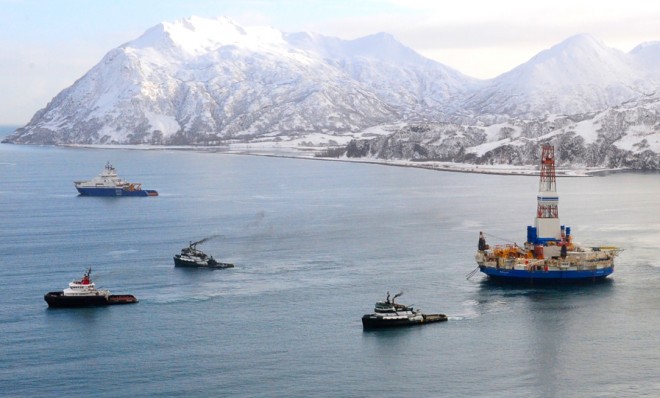Is Arctic drilling safe?
As the Obama administration tries to walk the line between environmental and economic interests, critics warn that the Arctic is too harsh for drilling

A free daily email with the biggest news stories of the day – and the best features from TheWeek.com
You are now subscribed
Your newsletter sign-up was successful
The Arctic Circle, the northernmost region of Earth that consists of the Arctic Ocean and the northern edge of eight countries, holds one of the planet's largest troves of untapped natural energy resources — an estimated 13 percent of the world's undiscovered oil (some 90 billion barrels), and 30 percent of the world's undiscovered natural gas.
These deposits, like so many others, are the source of a bitter fight between environmentalists wanting to protect the region and countries and companies who see their share of the resources as a potential economic boon — and their key to energy security.
In May, the Obama administration presented a plan for that tries to tightrope walk its way between the two sides.
The Week
Escape your echo chamber. Get the facts behind the news, plus analysis from multiple perspectives.

Sign up for The Week's Free Newsletters
From our morning news briefing to a weekly Good News Newsletter, get the best of The Week delivered directly to your inbox.
From our morning news briefing to a weekly Good News Newsletter, get the best of The Week delivered directly to your inbox.
"The Arctic region's energy resources factor into a core component of our national security strategy: energy security," the plan said. "The region holds sizable proved and potential oil and natural gas resources that will likely continue to provide valuable supplies to meet U.S. energy needs."
But then there's this: "Our economic development and environmental stewardship must go hand-in-hand. The unique Arctic environment will require a commitment by the United States to make judicious, coordinated infrastructure investment decisions, informed by science."
Why is such care needed? For one thing, because of the threat of spills. The Arctic is one of the least hospitable environments in the world for oil drilling (or human presence in general), and a recent incident in which the oil rig Kulluk ran aground during a storm has raised concerns about the possibility of a spill in the Arctic. In The New York Times, Andrew C. Revkin summed up a recent statement from the Natural Resources Defense Council:
It's another world up there. Arctic weather is even nastier than the weather at the site of the Kulluk's grounding. Gales howl across the Arctic Ocean. Total darkness envelops it half the year. Ice floes lock in the entire region six months a year, making navigation almost impossible. (The USCG has only a few icebreaker-class vessels in its entire fleet.)
A free daily email with the biggest news stories of the day – and the best features from TheWeek.com
And this unforgiving ocean wilderness is located more than 1,000 miles from the nearest Coast Guard base.
In the event of a spill — which, given the oil industry's 100-year track record, is practically certain — the Arctic's extreme environment would render containment measures useless. [The New York Times]
Drilling opponents also worry about wildlife. "The Chukchi Sea features a vast, shallow floor, and its seasonal ice cover helps polar bears, walrus, and seals to hunt," said Frances Beinecke at Switchboard. "To the east, the Beaufort's coastline is the number-one land denning site in America's Arctic for female polar bears. Endangered bowhead whales migrate through the area in the spring and, more significantly, in the fall when drilling would occur. Introducing massive industrial activity into this region would put many of these animals in peril. The oil exploration process alone requires powerful air guns that could injure or kill whales that rely on sound to find food and mate."
And then, of course, there's the climate change argument. Michael Byers, professor of international law at the University of British Columbia, talked to the Christian Science Monitor about how melting ice caps, though helpful for drilling in the short term, could cause problems down the line.
There's a strange circular paradox in Arctic drilling: The region's fossil-fuel extraction contributes to warming, which opens up drilling possibilities but also adds environmental turbulence that makes drilling so difficult.
Arctic ice melted at a record rate in 2012, which scientists attribute to rising temperatures from greenhouse gas emissions. While the changing conditions open up new opportunities in shipping lanes, the changing ice flows — along with unpredictable weather — make the Arctic a formidable place to drill for oil and gas.
When sea ice recedes, the choppy Arctic waters grow choppier, Beyers noted, and coastal communities suffer from increased levels of erosion. Melting permafrost threatens the stability of buildings, roads, and pipelines. [Christian Science Monitor]
Still, the Obama administration plans to proceed — but with care. "The Arctic is one of our planet's last great frontiers," President Obama wrote in May. "Our pioneering spirit is naturally drawn to this region, for the economic opportunities it presents and in recognition of the need to protect and conserve this unique, valuable, and changing environment."
Carmel Lobello is the business editor at TheWeek.com. Previously, she was an editor at DeathandTaxesMag.com.
-
 Bad Bunny’s Super Bowl: A win for unity
Bad Bunny’s Super Bowl: A win for unityFeature The global superstar's halftime show was a celebration for everyone to enjoy
-
 Book reviews: ‘Bonfire of the Murdochs’ and ‘The Typewriter and the Guillotine’
Book reviews: ‘Bonfire of the Murdochs’ and ‘The Typewriter and the Guillotine’Feature New insights into the Murdoch family’s turmoil and a renowned journalist’s time in pre-World War II Paris
-
 Witkoff and Kushner tackle Ukraine, Iran in Geneva
Witkoff and Kushner tackle Ukraine, Iran in GenevaSpeed Read Steve Witkoff and Jared Kushner held negotiations aimed at securing a nuclear deal with Iran and an end to Russia’s war in Ukraine